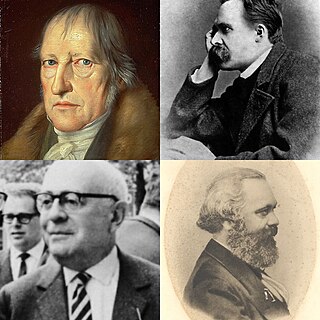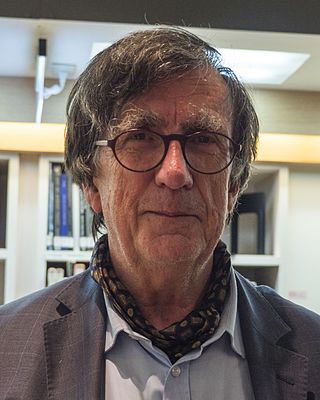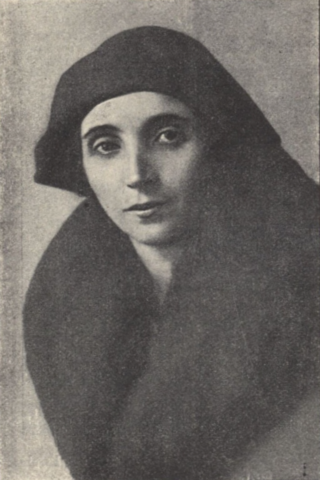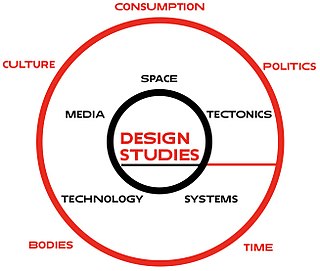Related Research Articles
Metaphilosophy, sometimes called the philosophy of philosophy, is "the investigation of the nature of philosophy". Its subject matter includes the aims of philosophy, the boundaries of philosophy, and its methods. Thus, while philosophy characteristically inquires into the nature of being, the reality of objects, the possibility of knowledge, the nature of truth, and so on, metaphilosophy is the self-reflective inquiry into the nature, aims, and methods of the activity that makes these kinds of inquiries, by asking what is philosophy itself, what sorts of questions it should ask, how it might pose and answer them, and what it can achieve in doing so. It is considered by some to be a subject prior and preparatory to philosophy, while others see it as inherently a part of philosophy, or automatically a part of philosophy while others adopt some combination of these views.
Analytic philosophy is an analysis focused, broad, contemporary movement or tradition within Western philosophy, especially anglophone philosophy. Analytic philosophy is characterized by a clarity of prose; rigor in arguments; and making use of formal logic and mathematics, and, to a lesser degree, the natural sciences. It is further characterized by an interest in language and meaning known as the linguistic turn. It has developed several new branches of philosophy and logic, notably philosophy of language, philosophy of mathematics, philosophy of science, modern predicate logic and mathematical logic.

German philosophy, meaning philosophy in the German language or philosophy by German people, in its diversity, is fundamental for both the analytic and continental traditions. It covers figures such as Gottfried Wilhelm Leibniz, Immanuel Kant, Georg Wilhelm Friedrich Hegel, Karl Marx, Friedrich Nietzsche, Martin Heidegger, Ludwig Wittgenstein, the Vienna Circle, and the Frankfurt School, who now count among the most famous and studied philosophers of all time. They are central to major philosophical movements such as rationalism, German idealism, Romanticism, dialectical materialism, existentialism, phenomenology, hermeneutics, logical positivism, and critical theory. The Danish philosopher Søren Kierkegaard is often also included in surveys of German philosophy due to his extensive engagement with German thinkers.

Science studies is an interdisciplinary research area that seeks to situate scientific expertise in broad social, historical, and philosophical contexts. It uses various methods to analyze the production, representation and reception of scientific knowledge and its epistemic and semiotic role.

Bruno Latour was a French philosopher, anthropologist and sociologist. He was especially known for his work in the field of science and technology studies (STS). After teaching at the École des Mines de Paris from 1982 to 2006, he became professor at Sciences Po Paris (2006–2017), where he was the scientific director of the Sciences Po Medialab. He retired from several university activities in 2017. He was also a Centennial Professor at the London School of Economics.
In art history, formalism is the study of art by analyzing and comparing form and style. Its discussion also includes the way objects are made and their purely visual or material aspects. In painting, formalism emphasizes compositional elements such as color, line, shape, texture, and other perceptual aspects rather than content, meaning, or the historical and social context. At its extreme, formalism in art history posits that everything necessary to comprehending a work of art is contained within the work of art. The context of the work, including the reason for its creation, the historical background, and the life of the artist, that is, its conceptual aspect is considered to be external to the artistic medium itself, and therefore of secondary importance.

Peter Weibel was an Austrian post-conceptual artist, curator, and new media theoretician. He started out in 1964 as a visual poet, then later moved from the page to the screen within the sense of post-structuralist methodology. His work includes virtual reality and other digital art forms. From 1999 he was the director of the ZKM Center for Art and Media Karlsruhe.

Aesthetics of music is a branch of philosophy that deals with the nature of art, beauty and taste in music, and with the creation or appreciation of beauty in music. In the pre-modern tradition, the aesthetics of music or musical aesthetics explored the mathematical and cosmological dimensions of rhythmic and harmonic organization. In the eighteenth century, focus shifted to the experience of hearing music, and thus to questions about its beauty and human enjoyment of music. The origin of this philosophic shift is sometimes attributed to Baumgarten in the 18th century, followed by Kant.

Vilém Flusser was a Czech-born Brazilian philosopher, writer and journalist. He lived for a long period in São Paulo and later in France, and his works are written in many different languages.

Isabelle Stengers is a Belgian philosopher, noted for her work in the philosophy of science. Trained as a chemist, she has collaborated with Russian-Belgian chemist Ilya Prigogine and French philosopher/sociologist Bruno Latour among others, and has written widely on the history of science as well as philosophers such as Gilles Deleuze, Alfred North Whitehead, Donna Haraway, and Michel Serres.

Johanna Drucker is an American author, book artist, visual theorist, and cultural critic. Her scholarly writing documents and critiques visual language: letterforms, typography, visual poetry, art, and lately, digital art aesthetics. She is currently the Martin and Bernard Breslauer Professor in the Department of Information Studies at the Graduate School of Education and Information Studies at UCLA. In 2023, she was elected to the American Philosophical Society.
Design theory is a subfield of design research concerned with various theoretical approaches towards understanding and delineating design principles, design knowledge, and design practice.
Philosophy of music is the study of "fundamental questions about the nature and value of music and our experience of it". The philosophical study of music has many connections with philosophical questions in metaphysics and aesthetics. The expression was born in the 19th century and has been used especially as the name of a discipline since the 1980s.

Ksenija Atanasijević (1894–1981) was the first recognised major female Serbian philosopher, and the first female professors of Belgrade University, where she graduated. She wrote about Giordano Bruno, ancient Greek philosophy and the history of Serbian philosophy, and translated important philosophical works into Serbian, including works by Aristotle, Plato, and Spinoza. She was also an early Serbian feminist writer and philosopher.

Agalma: Rivista di Studi Culturali e di Estetica is an academic journal dedicated to cultural studies and aesthetics. It was established in 2000 by the philosopher Mario Perniola and a group of Italian and international intellectuals in response to the widely felt discontent with the international and Italian philosophical and cultural contexts at the time. Its purpose is to provide a forum for the theoretical work around cultural studies and aesthetics in Italy. The title of the journal reflects its aims, contents, and orientation. "Agalma" is an ancient Greek word that means ornament, gift, image, and statue. It possesses a broad meaning in which economic value, aesthetic aspects, cultural studies, and symbolic power come together. The first part of an issue is usually monographic and connected to the theme of an international conference organized by the Chair of Aesthetics of the University of Rome Tor Vergata and other cultural institutions. The other sections include discussions, interviews, and reviews covering a wide range of concepts associated to both Western and non-Western philosophical thought.

Graham Harman is an American philosopher. He is Distinguished Professor of Philosophy at the Southern California Institute of Architecture in Los Angeles. His work on the metaphysics of objects led to the development of object-oriented ontology. He is a central figure in the speculative realism trend in contemporary philosophy.
1991 in philosophy

Design studies can refer to any design-oriented studies but is more formally an academic discipline or field of study that pursues, through both theoretical and practical modes of inquiry, a critical understanding of design practice and its effects in society.

Vicente Ferreira da Silva was a Brazilian logician, mathematician, and philosopher. He was one of first men in Brazil history to write and have published academic books on Logic and Phenomenology.
European Photography, based in Berlin, is an independent art magazine for international contemporary photography and new media. It was founded in 1980 and is published by the German artist Andreas Müller-Pohle.
References
- ↑ Galle, Per (18 February 2015). "Philosophy of Design". KADK. Retrieved 31 December 2016.
- ↑ Balsamo, Anne (2011). Designing culture : the technological imagination at work. Durham NC: Duke University Press. ISBN 978-0822344452.
- ↑ Dilnot, Clive (2017). "Design, knowledge and human interest". Design Philosophy Papers. 15 (2): 145–163. doi:10.1080/14487136.2017.1388963.
- ↑ Drucker, Johanna (2014). Graphesis: Visual forms of knowledge production. Cambridge, Massachusetts: Harvard University Press. ISBN 978-0-674-72493-8.
- ↑ Flusser, Vilém (1999). The shape of things: a philosophy of design. London: Reaktion. ISBN 9781861890559.
- ↑ Fry, Tony (September 2020). Defuturing: A New Design Philosophy. Radical Thinkers in Design. London, England: Bloomsbury Visual Arts.
- ↑ Latour, Bruno (2009). "A Cautious Prometheus? A Few Steps Toward a Philosophy of Design (With Special Attention to Peter Sloterdijk)". In Fiona Hackne, Jonathn Glynne; Minto, Viv (eds.). Proceedings of the 2008 Annual International Conference of the Design History Society -- Falmouth, 3-6 September 2009 (PDF). Universal Publishers. pp. 2–10.
- ↑ Mollerup, Per (2019). Pretense Design: Surface over Substance. MIT Press.
- ↑ Verbeek, Peter-Paul (2005). What Things Do: Philosophical Reflections on Technology, Agency, and Design. Pa., Pennsylvania State University Press. ISBN 0271025395.